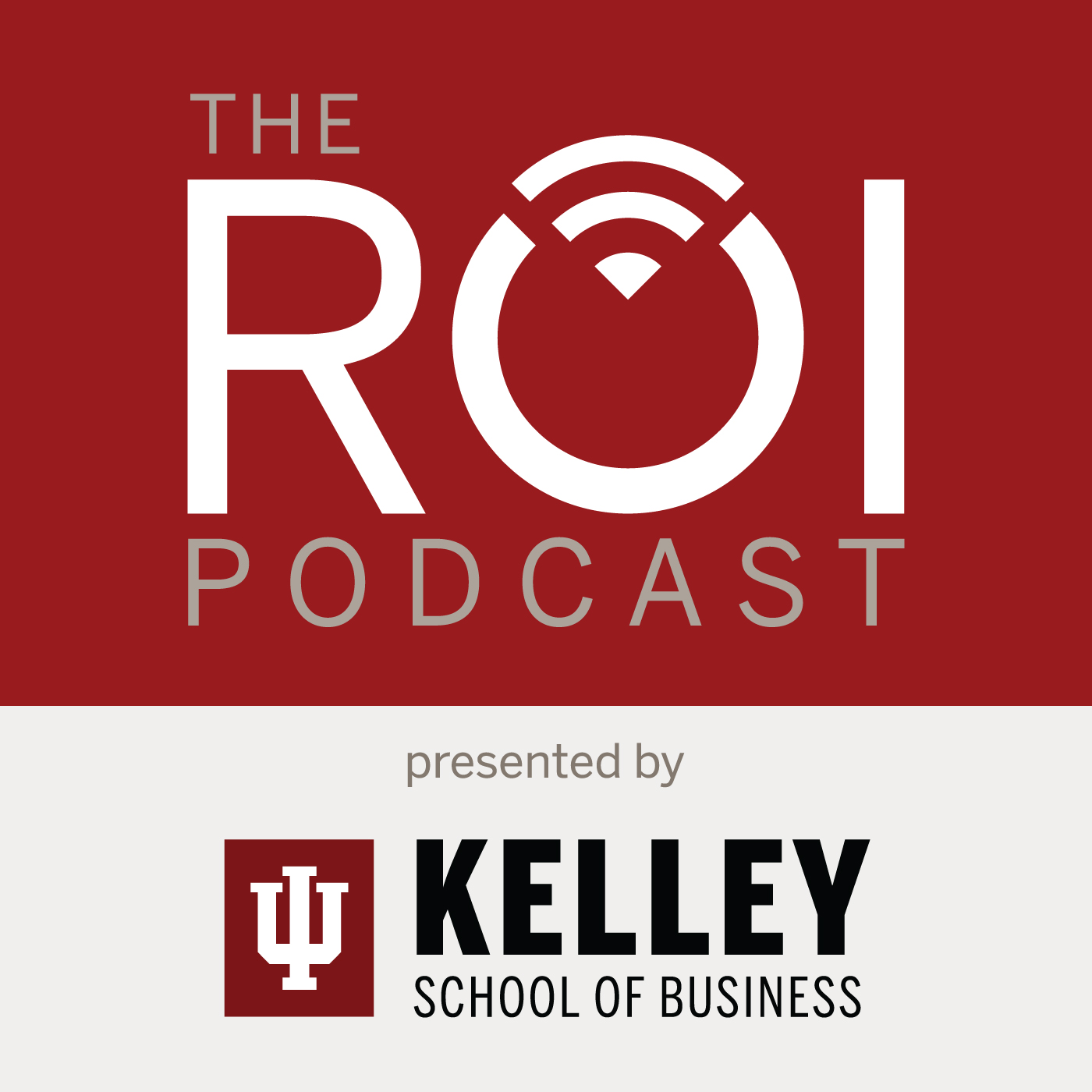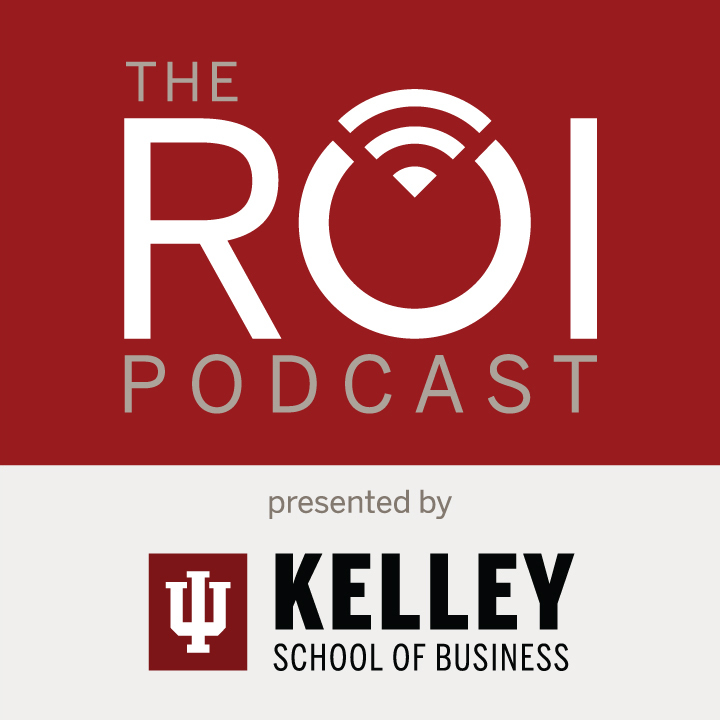
The ROI Podcast provides professionals from all industries with actionable insight from world-renowned faculty members at Indiana University's Kelley School of Business. Learn not only from award-winning faculty but business experts who are disrupting their respective industries. The ROI Podcast equips you and your organization with the knowledge to keep a competitive edge over the competition.
Episodes

Tuesday Jan 30, 2018
How organizations can build regulations into strategy | Ep. 36
Tuesday Jan 30, 2018
Tuesday Jan 30, 2018
Often times, organizations view regulations as a hindrance to business, limiting what a company can or cannot do. However, Julie Manning Magid, professor of business law at the Indiana University Kelley School of Business says organizations who build regulations into their business strategy create extraordinary results.
----
Do you have a question? Looking to get help on a business decision? Know a great guest for our show? Email roipod@iupui.edu so we can help your organization make better business decisions.
----
Ready to take your next step? Check out if a Kelley MBA is right for you: https://bit.ly/3m2G6D5
----
Show Notes:
(The ROI Podcast Music)
Shane: Hello everybody! Thanks for joining us once again on The ROI Podcast presented by The Kelley School of Business on the IUPUI campus in downtown Indianapolis. Hopefully, you are having a spectacular day – and we’re here to help BOOST your business knowledge through actionable insight! And joining us on this journey is my co-host, Phil Powell, who’s the associate dean of academic programs for the Kelley School. Phil – what’s going on?
Phil: (Replies)
Shane: Well, today we’re going to somewhat pick up where we left off last week when we were talking to professor Kim Saxton about equal pay for equal work. But today, we’re going to be speaking more from a strategy standpoint – and how gender equality will actually increase growth and revenue. I can tell you this is a very interesting discussion.
Julie: One of the things that we see in the current climate is that there are real consequences to not focusing on and working toward an equitable workplace, a place where people feel they can be heard and appreciated, and understanding the importance of having everybody at the table to do their very best in your organization.
Phil: That was Kelley School of Business Professor Julie Manning-Magid. Julie is a professor of business law and she’s the executive & academic director of the Randall L. Tobias Center for Leadership Excellence. And in our discussion with Julie, she mentioned the legal consequences that organizations need to be aware of when it comes to creating an equitable work environment.
Julie: Certainly there are consequences in terms of legal consequences, legal claims are something that we’re hearing a lot about now, but there are also major public relations issues when you do this wrong - we’re certainly seeing that as well. There is a certain numbers game that you have to think about, and if your numbers do not reflect well [from] the community you’re drawing them from, there’s a problem in your organization and that problem could lead to anything from corporate activism, to your government structure, to large claims that are class-based, to single claims - and even if it is just a single claim here or there, it adds up in terms of time, money, and morale. It’s not a good work environment if you’re getting a lot of these sort of claims.
Phil: As as we watch the news, read the papers, sometimes we wonder: How can such dynamic, well-managed organizations not catch these claims and issues beforehand? How do they not see this happening?
Julie: It is complicated, [and] I don’t want to downplay this requires attention and work and that not every organization that has been challenged is doing something wrong, but it is challenging and something that you have to pay attention to and focus on in a way that says, “Are we being truly inclusive of everyone in our organization and community?”
Shane: I’m gonna pause there for a moment because I really like how Julie breaks this down. Sometimes, we as humans can overcomplicate and over analyze, and in the case of this subject, by stepping back and asking that question “Are we being truly inclusive of everyone in our organization and community?” That can cause some deep reflection, right?
Phil: (Response)
Shane: And let’s talk about FMLA for a second… While this is a protection, there’s still a caveat there that can negatively impact women and their family.
Julie: So in the FMLA, you are protected for pregnancy after working a year for the employer. That works to the negative for women in a way it doesn’t negatively affect men because pregnancy is hard to time. If you think you might become pregnant sometime in the next year, you cannot change employers, because you will not have protection for leave to give birth. It’s something that doesn’t enter people’s minds until it becomes the reality of, “I can’t look for another job because we’re thinking of starting a family.” Again, this isn’t something that only negatively affects women, because it has a ripple effect on families, [and] it impacts men and how they are able to create a two-income family.
Shane: Let’s talk about this from a strategic angle. Yes, if complaints are filed and investigations are conducted around these issues, it’s going to cost the organization on the bottom line… But what about the impact it has on human capital?
Phil: You know, Shane… That’s an excellent point. The cost this has on your workforce is far greater than anything else… And Julie dives into to the specifics on the cost of this in today’s environment.
Julie: Right now, we’re at historically low unemployment rates, [and] it’s hard to get good workers in your workplace. If you’re an organization that does not treat people fairly, has poor morale, that doesn’t handle these issues well, you won’t have people working there – you certainly won’t have the best people working there. It’s a competitive market, and there are consequences to being a difficult place for women to work, and it’s not just women in of itself, it also is the fact that families are impacted by these decisions that are negative to where women work, and that has consequences as well across the board.
Julie: Law and ethics are such an important thing to think about in terms of business management. Many organizations and executives want a lawyer to handle anything legal-related, so it doesn’t become their problem, but then you’re having somebody else run what are some of the most important business decision that you’ll make. Executives know that there are legal implications to almost every decision they make, and the ethics that that implicates. That has to be something that you embrace as a manager or an executive, or you’ll make poor decisions by having somebody else worry about one of the major issues businesses deal with, legal compliance.
Shane: So what Julie’s saying is the best organizations are seeing a shift in the role of chief counsel… Rather than being somebody who solely protects there organization and quote keeps the governor off their back”, the chief council becomes an important part of an organization’s strategic core.
Julie: Recognizing that regulations and complying with them have to be part of your strategy decisions is the way that you better prepare your organization for excelling. As we’ve been talking about, that law pushes you to be very inclusive of people in your organization and part of your strategic decisions.
Shane: And let’s remember – there have been organizations who have not taken this strategy previously – and it caught up with them.
Phil: So if we’re to summarize what we’ve discussed today – we’ve made some progress for women in the workplace, but there’s a lot of work that remains to be done. Whether it be in programs to help women climb the corporate ladder, tweaks to FMLA, or just being more inclusive – we need to look at the law not as regulation, but as guidance and a start to what we should be doing – and that’s taking a strategic approach and implementing the law to that approach.
Julie: The job of managing people is never done - it is a day to day practice that good managers engage in because people are their most important asset, and that’s how they should be treated and thought about.

Comments (0)
To leave or reply to comments, please download free Podbean or
No Comments
To leave or reply to comments,
please download free Podbean App.